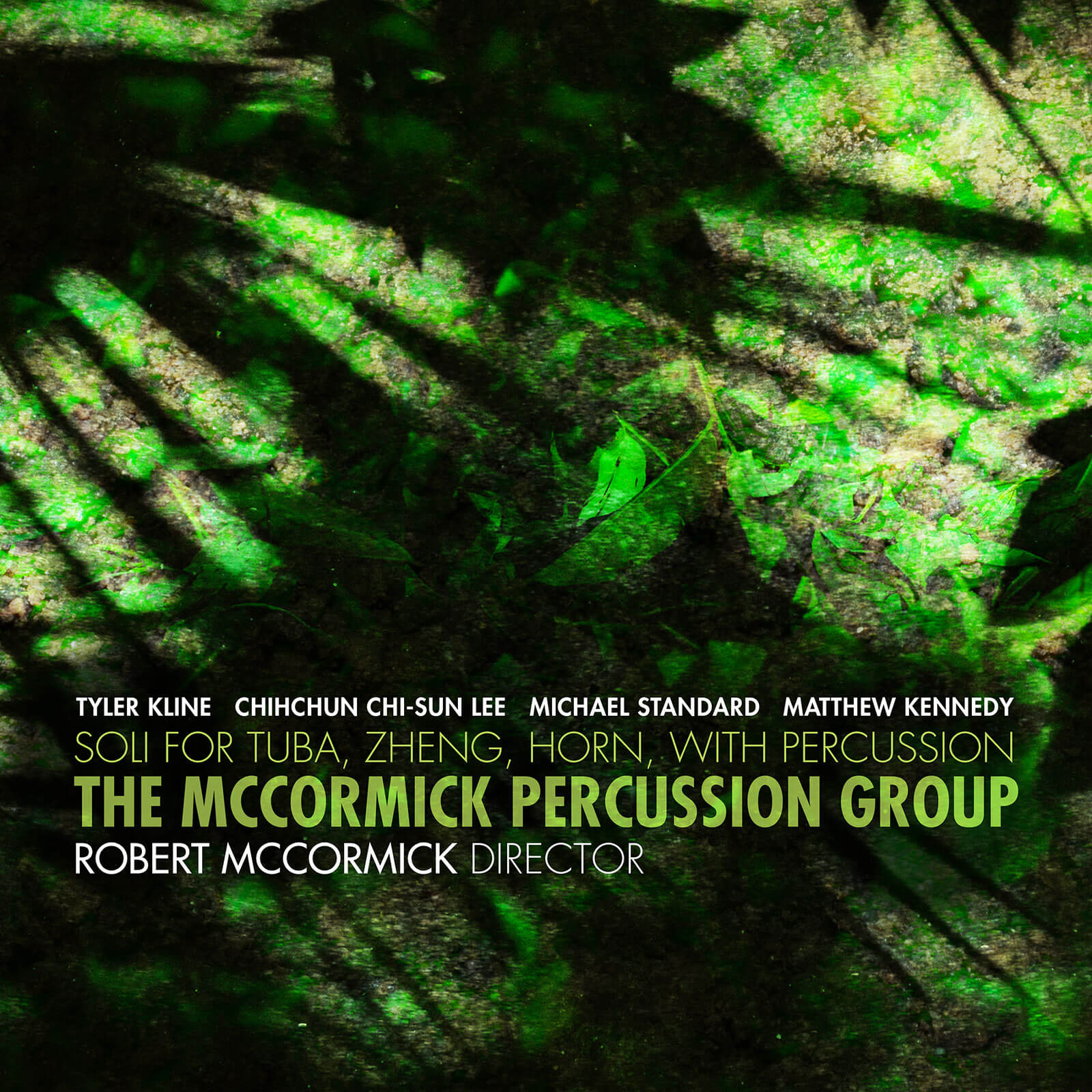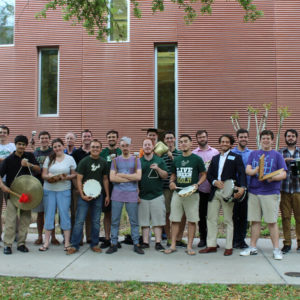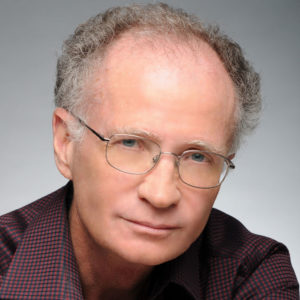
Share Album:
Soli for Tuba, Zheng, Horn, With Percussion
McCormick Percussion Group | Robert McCormick director
Joseph Alvarez tuba
Haiqiong Deng zeng
Jay Hunsberger tuba
Eric Hawkins horn
SOLI FOR TUBA, ZHENG, HORN WITH PERCUSSION is percussionist Robert McCormick’s tenth album with PARMA Recordings. On their latest album, the McCormick Percussion Group performs five compositions from four distinct composers, each of whom contributes striking works that range from personal to global inspiration.
The album opens with Loam, a concerto for tuba and percussion ensemble composed by Tyler Kline. Much of the concerto is texture-based in order to convey the idea of loam, or soil, with some parts of the music reflecting the sound of the earth being tilled. The general arc of the concerto is cyclical, a metaphor for being born from the earth and returning to the earth after death. Chihchun Chi-sun Lee’s Double Concerto for Tuba, Zheng and Percussion Orchestra is a unique amalgam featuring zheng, tuba, and percussion. The first movement creates a unifying sense of color, timbre, and gesture. Movement II mainly focuses on the tuba and zheng, while Movement III displays the sound of the tuba, zheng, and percussion in perfect balance.
Written by Michael Standard, Stamina for percussion quartet and horn soloist is comprised of three parts: “Fracture,” “Rehabilitation,” and “Capacity.” “Fracture” sees a breaking apart in every element of the music. “Rehabilitation” strings together the previously fractured pitch material in a new way using glissandos. The final stage, “Capacity,” uses this new pitch organization to fill the spaces with notes. Following this piece, composer Matthew Kennedy and his In Pursuit of Ghosts explores the journey from one chapter of life to the next through the structure of the three-part concerto.
SOLI FOR TUBA, ZHENG, HORN WITH PERCUSSION closes with Zusammenflusses (Confluences), another work by Lee, that captures the differences and similarities of the zheng with the vibraphone and cymbal. Zusammenflusses aptly concludes this new addition to the McCormick Percussion Group’s oeuvre, and the album as a whole inspires listeners to explore new and unexpected combinations of sounds to create innovative music.
Listen
Stream/Buy
Choose your platform
Track Listing & Credits
| # | Title | Composer | Performer | |
|---|---|---|---|---|
| 01 | Loam: I. | Tyler Kline | McCormick Percussion Group | Robert McCormick, director; Joseph Alvarez, tuba; Yin Long, piano | 7:59 |
| 02 | Loam: II. | Tyler Kline | McCormick Percussion Group | Robert McCormick, director; Joseph Alvarez, tuba; Yin Long, piano | 5:27 |
| 03 | Loam: III. | Tyler Kline | McCormick Percussion Group | Robert McCormick, director; Joseph Alvarez, tuba; Yin Long, piano | 9:34 |
| 04 | Loam: IV. | Tyler Kline | McCormick Percussion Group | Robert McCormick, director; Joseph Alvarez, tuba; Yin Long, piano | 6:47 |
| 05 | Double Concerto for Tuba, Zheng & Percussion Orchestra: I. | Chihchun Chi-sun Lee | McCormick Percussion Group | Robert McCormick, director; Jay Hunsberger, tuba; Haiqiong Deng, zheng | 5:24 |
| 06 | Double Concerto for Tuba, Zheng & Percussion Orchestra: II. | Chihchun Chi-sun Lee | McCormick Percussion Group | Robert McCormick, director; Jay Hunsberger, tuba; Haiqiong Deng, zheng | 2:59 |
| 07 | Double Concerto for Tuba, Zheng & Percussion Orchestra: III. | Chihchun Chi-sun Lee | McCormick Percussion Group | Robert McCormick, director; Jay Hunsberger, tuba; Haiqiong Deng, zheng | 5:28 |
| 08 | Stamina: I. Fracture | Michael Standard | McCormick Percussion Group | Robert McCormick, director; Eric Hawkins, horn | 5:26 |
| 09 | Stamina: II. Rehabilitation | Michael Standard | McCormick Percussion Group | Robert McCormick, director; Eric Hawkins, horn | 3:41 |
| 10 | Stamina: III. Capacity | Michael Standard | McCormick Percussion Group | Robert McCormick, director; Eric Hawkins, horn | 1:07 |
| 11 | In Pursuit of Ghosts: I. Heartland | Matthew Kennedy | McCormick Percussion Group | Robert McCormick, director; Joseph Alvarez, tuba | 5:20 |
| 12 | In Pursuit of Ghosts: II. Cat's Cradle | Matthew Kennedy | McCormick Percussion Group | Robert McCormick, director; Joseph Alvarez, tuba | 3:13 |
| 13 | In Pursuit of Ghosts: III. Spirits | Matthew Kennedy | McCormick Percussion Group | Robert McCormick, director; Joseph Alvarez, tuba | 3:43 |
| 14 | Zusammenflusses | Chihchun Chi-sun Lee | McCormick Percussion Group | Robert McCormick, director; Haiqiong Deng, zheng; Robert McCormick, percussion | 9:01 |
Recorded at the Springs Theatre Recording Studio in Tampa FL
Recording Engineer John Z Stephan
Loam Recorded November 2017
Double Concerto Recorded September 2015
Stamina Recorded November 2018
In Pursuit of Ghosts Recorded 2018
Zusammenflusses Recorded September 2013
Executive Producer Bob Lord
Executive A&R Sam Renshaw
A&R Director Chris Robinson
VP, Audio Production Jeff LeRoy
Audio Director Lucas Paquette
Mastering Shaun Michaud
VP, Design & Marketing Brett Picknell
Art Director Ryan Harrison
Design Edward A. Fleming
Publicity Patrick Niland, Sara Warner
Artist Information

McCormick Percussion Group
The McCormick Percussion Group is recognized by critics and composers throughout the world for their unique recordings and interpretations of music decidedly outside of the mainstream. MPG often collaborates with other non-percussion musicians to explore and develop new trends of compositional thought. Among the most recorded ensembles of the genre, MPG has recorded many award winning albums for Ravello Records (dist. by Naxos). To ensure the original intent of each work, composers are often invited to rehearse with the ensemble and supervise recording sessions. Under the direction of Robert McCormick, MPG is a resident ensemble at the University of South Florida in Tampa.

Robert McCormick
Robert McCormick is currently Professor of Music at the University of South Florida in Tampa. He served as principal percussionist/assistant timpanist with the Florida Orchestra for 20 seasons. He is a former member of the Harry Partch Ensemble and often performs and records with high profile artists of all genres. In 2010, he conducted the premiere performance of Chan Hae Lee’s Korean folk opera Simcheongga at the National Center of Performing Arts in Seoul. In March 2014 McCormick performed the world premiere of Baljinder Sekhon’s Double Percussion Concerto at Carnegie Hall with percussionist Lee Hinkle. McCormick was the 2006 recipient of the Florida Music Educator of the Year Award; the 2007 Grand Prize in the Keystone Percussion Composition Award; the 2010 University Distinguished Teacher Award; and the 2015 Percussive Arts Society Lifetime Achievement in Education Award. He has also received several Global Music Awards for his albums, many of which are published on the Ravello Records label and distributed by Naxos. McCormick proudly endorses Encore Mallets, Grover Pro Percussion, and Zildjian Cymbals.
Joseph Alvarez
Joseph Alvarez is Lecturer of Tuba and Euphonium at the University of South Florida and the principal tubist of the Imperial Symphony. Previously, he served as principal tubist of Sinfonia da camera in Urbana IL. Alvarez has performed with ensembles such as the Sarasota Orchestra, Orlando Philharmonic, New World Symphony, Illinois Symphony, Champaign-Urbana Symphony, and Chicago-based new music collective Dal Niente. He has performed under the baton of conductors such as Esa-Pekka Salonen, Barry Wordsworth, Leonard Slatkin, James Gaffigan, Yan Pascal Tortelier, Larry Rachleff, Peter Oundjian, and Kristjan Jarvi. Recently, Alvarez served as an adjudicator and performing artist at the 2018 Southeast Tuba Euphonium Conference (SERTEC) in addition to being awarded a grant from the National Alliance for Audition Support (NAAS).
Haiqiong Deng
Haiqiong Deng is a performer of the traditional Chinese instrument known as the zheng (or guzheng). She was the recipient of FSU College of Music Research Fellowship (2018), the Florida Folk Heritage Award (2017), the Florida Individual Artist Fellowship (2013), and the Master Artist of the Florida Folklife Apprenticeship Award (2012). She was also the winner of the Outstanding Performance Prize at the Chinese National Zheng Competition in Shanghai in 1995. Both of her albums, Mountain, Water, Sentiments – Traditional Chinese Zheng Masterpieces Performance by Haiqiong Deng and Echoes of Strings – Classical Indian Music by Sitar and Zheng were nominated for the 13th Annual Independent Music Awards in the “World Traditional” Category in 2014.
Eric Hawkins
Eric Hawkins, an Atlanta-based Horn player, is rapidly becoming a new face in the freelance orchestral and chamber scene. Hawkins frequently performs with ensembles such as The Atlanta Pops Orchestra, The Atlanta Opera Orchestra, The Georgia Symphony Orchestra, Serenbe Playhouse, and his woodwind quintet, Little 5 Winds. During his time in Atlanta, he has been able to collaborate and perform with high-profile artists and bands such as Hans Zimmer, Kansas, Chloë Agnew, Katie Deal, Secret Garden, and John Driskell Hopkins from Zac Brown Band. Recently, he recorded with the Atlanta Pops Orchestra Ensemble and bluegrass band Balsam Range for the band’s newest album Mountain Overture, released in April 2018. Hawkins is currently on the faculty at the University of West Georgia.
Jay Hunsberger
Jay Hunsberger was the Principal Tubist of the Sarasota Orchestra from 1987 through 2017. During this time he also served as Professor of Tuba and Euphonium at the University of South Florida.
Ensemble Personnel
Rod Alnord, Jacob Barber, Katlyn Barbur, William Brown, Nick Bruno, AJ Cerrito, Grace Chang, Hayden Dumars, Tyler Evans, Nicolas Faivre, Michael Giunta, Adam Gould, Kaycie Howell, Trevor Hund, Derek Letsche, Lionel Martinez, Maria Petropoulos, Anand Rehsi, Nicolas Remy, Israel Rivera, Jazmine Rodriguez, Manuel Rosadilla, Jessyca Rose, Michael Skillern, Wes Sleeper, Kyle Spence, Michael Standard, Kyle Uber, Hannah Warner, and Yin Long.
Special thanks to John Z Stephan and the Springs Theatre Recording Studio, located in Tampa FL.
Tyler Kline
Tyler Kline is a composer, arranger, and audio engineer currently residing in Tampa FL. His music has been performed throughout North America and Europe as well as in Brazil and Taiwan. Recent compositions focus on the use of extended sounds/techniques in order to create timbral similarities or differences, as well as textures between instruments, voices, and/or electronics. Kline’s work is deeply influenced by the idea of Wabi-Sabi, a Japanese aesthetic and world view that values transience, imperfection, and impermanence. More broadly, his compositions draw influence from a variety of extra-musical sources, primarily literature. In addition to his work as a composer, Kline is also co-artistic director of Terroir New Music, an event series that combines the music of living composers with the work of local chefs and brewers. He is also a classical music radio announcer at WSMR, which is part of WUSF Public Media.
Chihchun Chi-Sun Lee
Taiwanese-American composer, Chihchun Chi-Sun Lee’s works were described as “explor[ing] a variety of offbeat textures and unusual techniques” by Gramophone and “eastern techniques blended with sophisticated modern writing style” by “Amadeus” Il mensile della grande musica. Lee has received honors including winning the Brandenburg Symphony International Composition Competition in Germany, a Guggenheim Fellowship, a Theodore Front Prize from IAWM, ISCM/ League of Composers Competition, and an International Festival of Women Composers Composition Prize. She has received commissions from Fromm Music Foundation at Harvard University, the Barlow Endowment, the Taiwan National Culture and Arts Foundation, Boston Symphony Orchestra, National Taiwan Symphony Orchestra, Taiwan Philharmonic, National Orchestra of Korea, and Taiwan National Chinese Orchestra, just to name a few. Her music has been performed at Carnegie Hall, the 2010 Winter Olympics in Vancouver, UNESCO International Rostrum of Composers, and various international festivals and broadcasts worldwide. Please visit her website: www.chihchunlee.com
Michael Standard
Michael Standard is a composer of acoustic and electronic music for the concert stage and digital media. Standard’s compositions seek a singular voice from explorations into expressions of human spirit, scientific exploration, contemplative practice, and communicative principles. Each work is formulated with its own identity while remaining conscientious of its social and artistic context. Standard organized a series of performances of his chamber work while living in Atlanta, including Beltline Aviary, a flute/percussion duet commissioned by Art on the Beltline and based on birdsongs common around the City of Atlanta. His work, mechanics to wit for piano and electronics, was selected for a performance at the 2018 Electroacoustic Barn Dance in Jacksonville FL, and his first brass quintet received its premiere at the 2018 Mostly Modern Festival by the Atlantic Brass Quintet. Standard has also studied percussion with Stuart Gerber and Charles Settle. He is active as a chamber musician and orchestral performer, and has performed with the Mostly Modern Orchestra and World Youth Wind Orchestra Project. Standard currently studies with Baljinder Sekhon and Robert McCormick while working towards a master’s degree in composition and percussion at the University of South Florida in Tampa as a Graduate Teaching Assistant.
Matthew Kennedy
American composer Matthew Kennedy’s music is said to contain “disarming clarity and simplicity,” often seeking out dark places with “an uninhibited wonder and spirit of exploration.” His work has received critical acclaim including honors from ASCAP, BMI, Society of Composers Inc., Boston Musica Viva, Hartford Opera Theater, and he has had residencies at Marble House Project (VT), Crosshatch Center for Art and Ecology (MI), Horned Dorset Artist Colony (NY), Taleamor Park (IN), and the Mayapple Center for the Arts and Humanities (CT). Recent activities for Kennedy include performances at New Music Gathering, North American Saxophone Alliance National Conferences, Northwestern University New Music Conference, M-Prize Competition, and commissions by Foot-in-the-Door Ensemble, Lotus Trio, and bassist Robert Black. He is currently a Visiting Professor of Music Theory and Composition at the University of South Florida and on the composition faculty at the Killington Music Festival.
